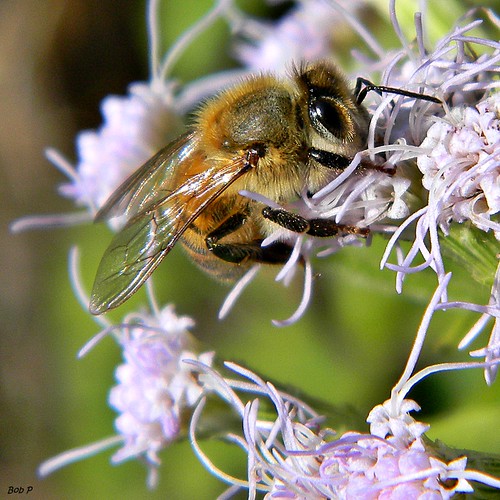In case you missed it, there is new research out on yet another possible cause of Colony Collapse Disorder killing honey bees. This time it is a parasitic fly. Previously, researchers have also found a fungus and a virus that, together, seem to be another major contributing factor. Stress from infections with varoa and tracheal mites may well be increasing susceptibility to these other problems as well.
The picture that is emerging is not of
one single cause, but a network of interacting pests and disease that
are taking the hives down. And this growing group of bee problems may
well have at their root a perennially problematic part of modern
agriculture: monoculture.
Virtually all of our food today is grown in giant fields of a single plant variety. Where those plants need bees to pollinate them, that presents a problem. Take almonds for an example. For just a brief time each spring, acres and acres of almond trees are in flower in California, and they all need bees in order to make almonds. All that bloom is a giant bonanza of food for any bee in the area, but all the rest of the year, they are a wasteland, because there are almost no other plants to bloom at different times and support the bees once the almond bloom is over. So bees get shipped in, huge truck loads of them criss-cross the country moving from field to field as different crops come into bloom. All that moving around works very well to effective pollinate the crops, but it makes for a major problem. New pest and disease show up all the time, that is the nature of the world. Pathogens evolve and migrate, and their hosts evolve to tolerate and resist them. We've seen this already with the older mite problems with bees. At first it was devastating, but newer bee strains are more and more resistant thanks to breeding and simple old fashioned natural selection. But when bees move around so much, they move with them all their local pests and diseases. The very pattern of colony collapse disorder – many problems, each individually more or less manageable, but devastating in their sum – is exactly what we would expect from this sort of mass movement of bee hives. Every new problem can become, almost instantly a national, even global problem, and join forces with other pests before the bees have a chance to develop resistance.
What is particularly interesting, and
surprisingly rarely mentioned, is that here in the United States all
these honey bee problems are a significant economic issue, but not necessarily an ecological one. Honey bees are native to Europe, and are in fact
one of the first non-native invasive species Europeans introduced. We
have a whole host of native, pollinating species, which are not very
closely related to the honey bee, and have radically different life
cycles and hive structures, so there is no reason to assume the honey
bee problems will translate into bumble bee or wasp problems. In
natural areas, or your own diverse backyard, the loss of feral honey
bees will probably actually allow your native bees and wasps to
thrive, and completely step in to fill the gap left by the honey
bees. A gap, after all, the filled for thousands of years before the
honey bee arrived. Hopefully, sometime down the line, we'll be able
to figure out a economically feasible alternative to monocultures,
but until then, expect to periodically pay a lot for almonds, and to
hear about the latest devastating problem for honey bee


6 comments:
I hadn't really thought about the monocultures reducing the populations of native bees and other pollinating insects because there wasn't food year-round to support them. But you are absolutely right. Diversity should be a tenet in growing any crop.
That's such a good point...our current way of growing/producing food is so far from any natural order that it tips the scales out of balance, as it were. The shipping of honey bees all over the country has always struck me as particularly odd. You'd think it would be worth the growers time/investment to simply provide a few parcels of land around their crops with a variety of plants for bee colonies to establish permanent hives...especially native bees, of which there are so many varieties.
I hope this message finds you well. I wanted to share with you that I've kept a journal my entire life, and every New Year. In addition, I wanted to mention a service that I recently learned about. It's called MRAuto Approved, and it offers a variety of high-quality vehicles for lease or purchase.
This blog sheds light on the multifaceted challenges facing honey bees, linking Colony Collapse Disorder to parasitic flies, fungi, viruses, and monoculture in agriculture. A thought-provoking exploration of interconnected issues impacting bee colonies and our food supply.
Domestic Violence Lawyer New Jersey
Post a Comment